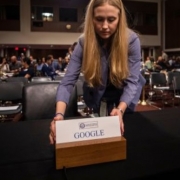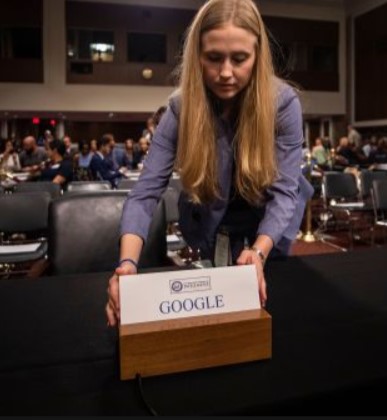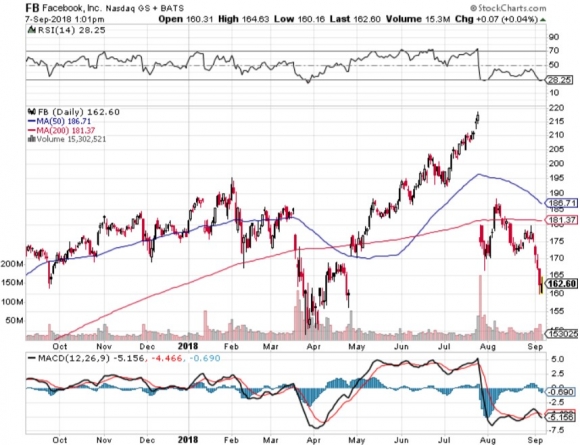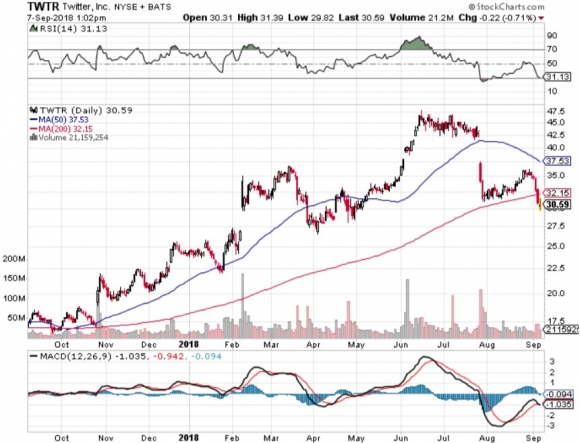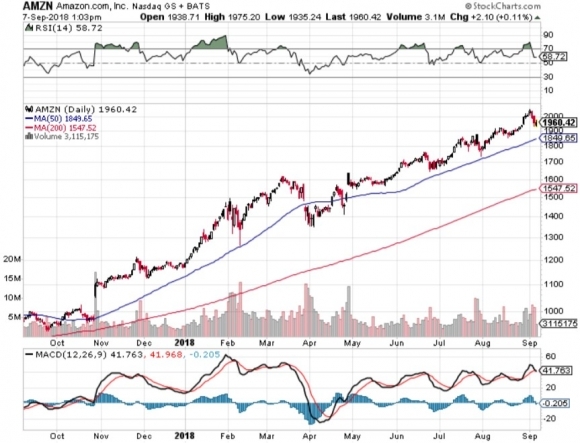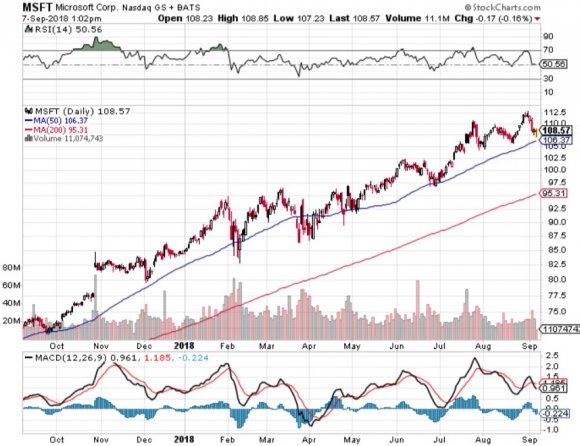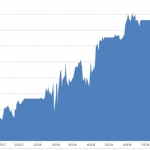Google’s Breakfast of Rotten Eggs
In a recent interview Google CEO Sundar Pichai admitted he is “not a morning person” and maybe that was his argument for skipping out on the grilling that his contemporaries Facebook (FB) COO Sheryl Sandberg and CEO of Twitter (TWTR) Jack Dorsey received in front of Congress.
Or maybe Pichai managed to down a rotten egg that morning when eating his favorite staple breakfast “omelet with toast," because his decision to abort his date with Congress was a shocking error of judgment for a CEO that has had a flair for controversy lately.
With the whole world watching, the empty chair with a simple name tag with Google plastered over it represents the arrogance and excesses of Silicon Valley all mixed into one incongruous mixture.
This rookie move will open a can of worms for the company made famous by its search algorithm that dominates the developed world.
Google will have a target on its back going forward while creating a massive public relations backlash for a company that must fiercely defend its ad-laden profit engine going forward.
Instead of taking it on the chin like Facebook and Twitter, Google has voluntarily veered into a sticky situation, and all to avoid a few stomach wrenching questions from Congress.
How did this all happen?
In the beginning of June, Google decided to scrap its relationship with the U.S. Department of Defense.
Project Maven, as it was known, provided Google’s artificial intelligence (A.I.) technology to systematically analyze drone footage for the U.S. government.
Pichai chose to avoid renewing the contract, and Google Cloud CEO Diane Greene agreed it was a black eye for the company that applied its own technology to conspire against damaging human life.
Throwing fat on the fire, Pichai followed up by dismantling Project Maven and giving the thumbs up for code-name Dragonfly. This was a secret project aimed at the mainland Chinese market and rolling out a censored version of Google’s search engine by altering its construction of unique search algorithms for a mainland Chinese audience.
This incensed the higher-ups on Capitol Hill, as this move was largely viewed as pandering toward the Chinese communist government for monetary purposes at an uber-sensitive time between the two powerhouse nations, which remain mired in a tumultuous trade war.
The timing couldn’t be worse for Pichai.
Dragonfly is already in beta mode and could be rolled out in the near future. However, I see it as dead on arrival, because there is no hope that Google can penetrate the fortress that is the Chinese business world.
Naturally, Google employees were dismayed and shocked by these startling revelations.
Pichai’s conspicuous no-show was in part driven by the potential wrath he would have faced by these recent reckless decisions that seemed to put the American government’s interests below the Chinese communist government.
The circus was there for everyone to see.
Sheryl Sandberg put on her bravest face.
It was obvious she had rehearsed every word to the utmost precision while Dorsey vehemently guarded his brainchild with honesty and zeal.
The testimonies made social media look perceivably criminal with a congressman even hinting the reason they aren’t allowed to do business in China was mainly a business model issue, and more specifically a legal issue.
Another congressman from West Virginia suggested Facebook’s Instagram was the source of the opioid epidemic ripping apart his state.
The only thing getting ripped apart during the intense grilling was Sheryl Sandberg’s well-practiced smile.
Dorsey and Sandberg were visibly uncomfortable with the line of questioning and rightly so.
Google would have looked worse if it showed up. But it managed to look 10 times worse than that by stonewalling the government’s invitation.
In a recent Pew Survey, data revealed 44% of youth between 18 to 29 last year deleted Facebook on their mobile phones.
Facebook is already a legacy platform in the throes of disruption cannibalized by its own asset - Instagram.
Instagram will be the sole survivor of Facebook by taking out Facebook itself, and that is bearish for overall business.
And that is if social media can hang on that long before it’s taken down by the hawks circling above in Washington.
When Facebook’s Cambridge Analytica scandal broke, the government was at sixes and sevens at attempting to figure out what on earth was going on behind the smoke and mirrors of the big data theatrics.
CEO Mark Zuckerberg was let off the hook with questions he wriggled out of, and Facebook shares powered on unabated.
This time it’s different.
Regulation is an imminent threat to social media revenues and could hurt earnings this quarter.
Investors need to migrate to higher tide, meaning Amazon (AMZN) and Microsoft (MSFT), because the waves still aren’t yet reaching those levels.
Amazon and Microsoft need to send a thank you note to Alphabet for screwing the pooch.
The administration has felt it convenient to barrage Silicon Valley to solidify the Republican base, and this tactic has resonated with the administration’s diehards.
A smorgasbord of FANG-bashing was the recipe to this madness. But now sights will be zoned in on dismantling Google, and Microsoft and Amazon will benefit from avoiding nasty, gut-churning headlines that turn up in the form of Twitter blitzkrieg.
Yes, Sheryl Sandberg, Facebook was “too slow” to react to foreign interference in the elections. But it is more accurate to characterize the battle social media faces against outside nefarious forces as impossible.
It is impossible for these social media platforms to police themselves while policing the whole world.
The incessant whack-a-mole scenario is the best-case outcome for the self-policing prospects of social media.
Once social media algorithms figure out how to stopgap one method of circumvention, the bad actors will move on to a more advanced way to manipulate the algorithmic police.
What does this mean for social media?
Costs are going up and will seep into profit margins.
Highlighting the upward trend of rising expenses for social media platforms is the daily cost of keeping CEO Mark Zuckerberg safe.
And remember, he lives in Palo Alto, California, one of the safest places on planet earth with a medium household income of $137,000.
In 2017, Facebook divvied up $7.3 million for Zuckerberg’s security detail and costs associated to it.
In 2018, shareholders approved a $10 million security package to keep Facebook’s head honcho safe. This underscored the ballooning risk of leading this controversial technology forum littered with conflict of interests, and on the verge of potentially perverting western democracy.
By the end of 2018, Facebook will increase its security division from 10,000 employees to 20,000.
And that is just the beginning.
Facebook’s security division is the fastest-growing division of fresh hires at Facebook.
Before Facebook and Twitter can ring in the profits, they face an exorbitant war against foreign “bot armies” intent on muddying the free flow of accurate information on domestic shores that target individuals deemed unaligned to the foreign actor’s interests.
There will be collateral damage and lots of it.
This does not sound like an easy road to profits, and it is not.
As midterm elections creep closer and closer, Facebook and Twitter must confront elevated headline risk, and any trading day could see shares wacked with a 10% haircut.
Following the government question-and-answer period, Twitter and Facebook will be designing a new resistance to stymie villainous foreign infiltration.
Ultimately, spending the bulk of employees’ work days realigning their business models to protect democracy, instead of creating new growth drivers, is not bullish for the stock price.
It is hard to breed much confidence in social media stock’s long-term narrative after listening to Dorsey and Sandberg speak.
They kept touching on needing help from government intelligence sources to aid them in catching the miscreants.
It makes sense to gradually nationalize social media platforms to unite the disconnect between social media’s war against foreign forces and the intelligence communities war against them.
It is clear hackers are exploiting the dislocation in cohesiveness between the cracks in social media and government intelligence.
But if that ever happens, it would be the end of Facebook and Twitter as we know it, as normal users would be averse to providing free content on a government-enabled platform as well as a strong blow to democracy itself.
It all makes sense now why Dorsey and Sandberg gave the answers they gave.
Their answers were akin to a faint plea for help while appearing contrite, hoping to persuade Congress to give them more time to figure it out.
This thinly veiled attempt to elongate the profit-making process and find a solution for a problem with no solution could end badly for these two companies.
Migrate to higher quality tech names in the short-term.
The resilient American economy powers on with the heavy lifting done by Silicon Valley albeit it with fewer lifters.
If social media stocks can get through the midterm elections unscathed, there is a trade on the table for these beleaguered companies rounding out a tumultuous year.
But getting to that point will be volatile, as this group of stocks have a rocky road ahead of them for the rest of the year.
I’m Not A Morning Person
________________________________________________________________________________________________
Quote of the Day
“I'm not a regular smoker of weed. Almost never,” – said CEO of Tesla Elon Musk on The Joe Rogan Experience podcast.

